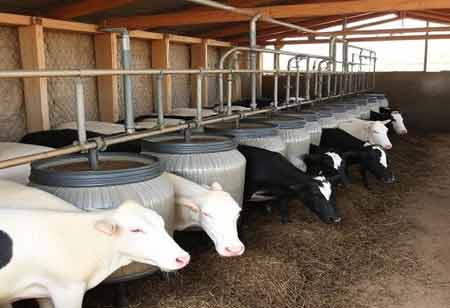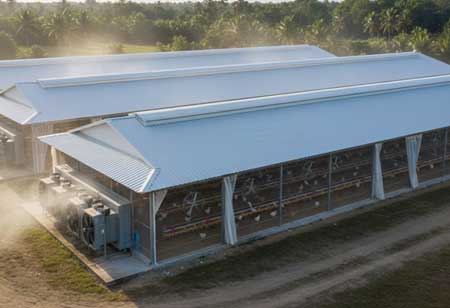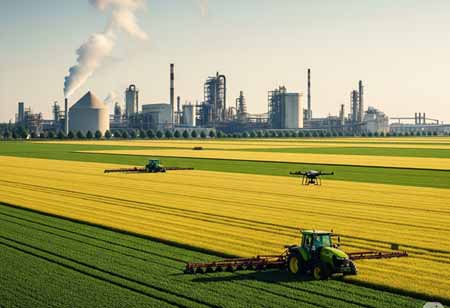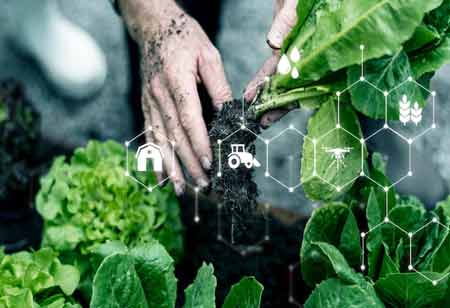Thank you for Subscribing to Agri Business Review Weekly Brief
The Role of Livestock Manure Fermentation Systems in Advancing Sustainable Waste Management in APAC
The Asia-Pacific (APAC) region, a global agricultural powerhouse, is at a transformative crossroads with its extensive livestock industry.

By
Agri Business Review | Wednesday, March 26, 2025
Stay ahead of the industry with exclusive feature stories on the top companies, expert insights and the latest news delivered straight to your inbox. Subscribe today.
The Asia-Pacific (APAC) region, a global agricultural powerhouse, is at a transformative crossroads with its extensive livestock industry. As sustainability challenges mount, the adoption of livestock manure fermentation systems is surfacing as a groundbreaking solution for waste management. These systems tackle environmental concerns and bolster agricultural productivity and economic resilience. This innovative approach aligns perfectly with the region's green initiatives by converting livestock waste into renewable energy and nutrient-rich organic compost. As APAC advances toward carbon neutrality, livestock manure fermentation systems represent a critical bridge between ecological preservation and sustainable agricultural growth.
Key Features of Fermentation Systems in APAC
Modern fermentation systems in the APAC region are designed to maximize efficiency and sustainability through advanced technological innovations. These systems incorporate optimized aeration, digestible substrate enhancement, and precise temperature control, ensuring consistent and efficient fermentation. Additionally, scalability is a key feature, with solutions tailored to accommodate diverse farming operations, from small-scale farms to sizeable industrial livestock facilities. This adaptability allows seamless integration of fermentation technology regardless of farm size or livestock type.
A strong emphasis on resource circularity enables these systems to convert livestock waste into valuable byproducts, including bioenergy and organic compost. This not only promotes a circular agricultural economy but also reduces reliance on chemical fertilizers and fossil fuels, enhancing farmers' self-sufficiency. Furthermore, integrating automation, data analytics, and Internet of Things (IoT) technology enhances operational efficiency. Real-time monitoring, remote control, and predictive maintenance capabilities streamline processes while improving productivity.
Applications and Benefits
One of the primary applications of fermentation systems in APAC is biogas production, a renewable energy source for electricity generation, heating, and farm machinery operations. Many rural communities in the region are expected to depend on biogas derived from livestock manure fermentation. Another critical benefit is the production of organic fertilizers, as fermented manure provides a nutrient-rich alternative to synthetic fertilizers, improving soil health and boosting crop yields—an essential factor for APAC’s agriculture-driven economies.
Additionally, these systems play a crucial role in reducing greenhouse gas emissions by capturing methane that would otherwise be released into the atmosphere. This aligns with global climate action initiatives, supporting sustainability goals, and mitigating environmental impact. Through these innovations, fermentation systems in APAC contribute to a more efficient, eco-friendly, and self-sustaining agricultural sector.
Industry Trends and Developments
Governments across the region actively promote the adoption of fermentation technologies through favorable policies, including subsidies, tax incentives, and technical assistance. These regulatory initiatives are expected to drive higher penetration rates by 2025. Additionally, collaborative efforts among agricultural research institutes, technology providers, and policymakers have accelerated advancements in fermentation technologies. Research and development initiatives increasingly focus on enhancing system efficiency and reducing operational costs.
Another notable trend is the growing preference for modular and portable fermentation systems, which offer farmers greater flexibility and require lower initial investments. This shift is expected to gain further momentum in the coming years. Furthermore, sustainability remains a key priority, influencing consumer and industrial preferences for eco-friendly waste management solutions. As a result, fermentation systems are becoming an integral component of sustainable agricultural practices, reinforcing their role in green farming initiatives.
Forecast for 2025
The APAC region is expected to emerge as a global leader in livestock manure fermentation systems, with adoption rates in emerging economies experiencing exponential growth. This surge is driven by supportive regulatory frameworks, increasing demand for renewable energy, and a heightened focus on environmental sustainability. Continuous technological advancements will further redefine the industry, with innovations such as enhanced automation, energy-efficient designs, and seamless integration with smart farm technologies becoming standard practices. Economically, the sector is projected to make substantial contributions by generating employment opportunities across system design, installation, operation, and maintenance, fostering growth at both local and regional levels. Additionally, these systems will play a critical role in APAC's carbon neutrality efforts, offering environmental benefits extending beyond energy generation, including improved soil health, reduced pollution, and more efficient resource recycling.
As the APAC region advances toward a more sustainable and innovative agricultural landscape, livestock manure fermentation systems are emerging as a pivotal component of this transformation. These systems offer a comprehensive solution by enhancing productivity, strengthening economic resilience, and promoting environmental sustainability. By 2025, their continued development is expected to redefine waste management while driving progress in energy generation, soil health, and regional sustainability. By adopting these systems, the APAC region demonstrates leadership in integrating technology with environmental responsibility, setting a benchmark for a greener and more equitable future.





